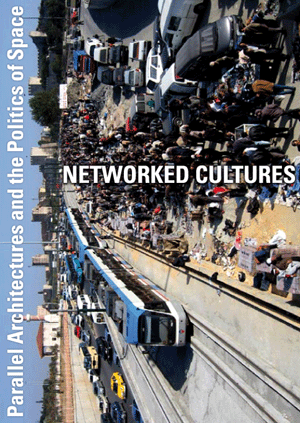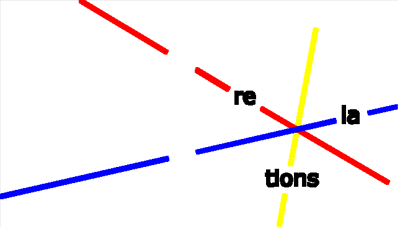_login
registrieren
_5 Factories - Worker Control in Venezuela Dario Azzellini & Oliver Ressler
_ALMOSTREAL ECF
_AnArchitektur Jesko Fezer
_Arizona Road Azra Aksamija
_Balkan Konsulat rotor
_Bata-ville: We are not afraid of the future Nina Pope + Karen Guthrie / www.somewhere.org.uk
_Black Benz Race krcf in collaboration with Felix Stalder, Arben Gecaj, Faton Topalli and Osman Osmani
_Black Sea Files Ursula Biemann
_Camp La Jolla Military ParkOwen Mundy
_CHANGE REALITY: Renaming the Streets of Zagreb REINIGUNGSGESELLSCHAFT
_Conceptual Paradise. There is a place for sophistication Stefan Roemer
_de-regulation Irit Rogoff, Kutlug Ataman, Stefan Roemer

____________Bloomberg SPACE, London
____________Kumu Art Museum Tallinn
____________Open Space, Open Systems - Vienna
____________CAA 2011 Conference, New York
____________Forum Stadtpark, Graz
____________Symposium, Istanbul
____________lungomare, Bozen/Bolzano
____________Metropolis Biennale 2007-17, Copenhagen
____________new publication available now
____________Mestna Galerija, Ljubljana
____________Livestream of Networked Cultures documentary
____________
|
_Database
project:
Relations
location: Berlin

date: 2005-01-01
info:
relations is a project initiated by the German Federal Cultural Foundation that is exploring new ways of cultural exchange between Germany and the countries of eastern Europe. relations becomes active wherever cultural actors, starting from local problems and issues, develop artistic projects which tackle socially relevant questions in a unique and idiosyncratic way and critically discuss and analyze both the present and the past.
Together with its cooperation partners, relations initiated in 2003 the projects ALTE ARTE (Chisinau), De/construction of Monument (Sarajevo), East Art Map (Ljubljana), Missing Identity (Pristina), Re:form (Warsaw), Visual Seminar (Sofia), and Zagreb – Cultural Kapital of Europe 3000 (Zagreb), as well as the international film project Lost and Found.
Since 2005 projects elaborated with German partners have ensued: Displaced (Berlin), WILD CAPITAL / WILDES KAPITAL (Dresden), ACADEMY REMIX (Frankfurt/Main), Mind the Map! – History Is Not Given (Leipzig), and Peripherie 3000 – Strategic Platform for Networked Centers (Dortmund).
In 2006, the book by relations, Leap into the City. Chisinau, Sofia, Pristina, Sarajevo, Warsaw, Zagreb, Ljubljana. Cultural Positions, Political Conditions. Seven Scenes from Europe was published by DuMont Literatur und Kunst Verlag, Cologne.
> relations projects
ALTE ARTE, Moldova
The internationally renowned artist Pavel Braila, supported by a homegrown team and relations, has developed ALTE ARTE, a TV art and culture magazine. Launched in January 2005, the magazine is broadcast fortnightly on the state-run station TV Moldova. Besides reporting on artists and current cultural events (both regional and international), original artistic works specially produced for ALTE ARTE are also shown.
De/construction of Monument, Bosnia-Herzegovina
After the collapse of the former Yugoslavia, new national elites have begun to rewrite the history of their countries. Memories are being extinguished, places renamed, books altered, and at the same time new hymns, icons and symbols established. Particularly the erection and dismantling of monuments is proof of a newly gained empowerment over history and its positing as a massive edifice. De/construction of Monument counters this manipulation with deconstruction. Artistic actions in public space, public discussions, workshops and diverse publications all pursue the goal of defusing the ideology implanted into historical understanding and of changing the currently existing cultural model.
Displaced, Berlin
Inspired by De/construction of Monument, the project Displaced was developed for Berlin. Displaced translates the themes addressed in De/construction of Monument into the local German context. The artists Maria Thereza Alves, Edgar Arceneaux, Danica Dakic, Šejla Kameric, Renata Stih & Frieder Schnock develop works for display in public spaces in Berlin. These works relate the state of postwar society in Sarajevo and the function of public memory to the German capital.
East Art Map, Ljubljana
The art project East Art Map is seeking to plot and make accessible previously unknown areas of postwar art in eastern Europe. The goal is to create an orientation aid that plots connections extending beyond national borders and enables comparative analysis.After “EAM I” invited curators, critics, and artists to present important art projects from their respective countries, since November 2004 “EAM II,” a map of these artistic activities, is accessible on the internet. The visitors to the site are able to contribute to the map by changing its topography. Finally, a comprehensive book is published.
Mind the Map! - History Is Not Given, Leipzig
Mind the Map! – History Is Not Given takes up the accents set by the East Art Map project. Mind the Map! strives to open up a space of exchange between different forms of artistic praxis, initiate concrete research projects and stimulate debate in the critical public. The ideas of young theoreticians and artists are discussed at an international symposium held in Leipzig.
Missing Identity, Kosovo
Missing Identity queries the attempts to establish a unified national identity and propagates the protection of difference. The project seeks to find out what is really missing. The project wants to create an artistic reality of what is experienced as absent in Kosovo: cultural, linguistic and ethnic diversity. Through art projects, educational work and the production of the art supplement ARTA for the weekly newspaper JAVA, the project is realizing an alternative public sphere and actively engaging for an open society.
ACADEMY REMIX
Städelschule, Frankfurt meets Missing Identity, Prishtina
Picking up on the themes addressed in Missing Identity, the program asks to what extent artistic production can reflect the mechanisms employed to form identity, a recurring element of the cooperation up until now. Students from the Missing Identity alternative art academy, the Contemporary Art Institute EXIT in Pristina, and the Frankfurt Städelschule come together to develop individual art projects, which are then realized in Pristina and Frankfurt. Joint theory workshops accompany these activities. Exhibitions in the Museum of Kosovo, Pristina and in Portikus, Frankfurt, as well as an international symposium show the results.
Re:form, Poland
Poland is opening up to globalization, Poland is modernizing. Re:form is undertaking the attempt to re-read Polish (art) history from the perspective of the present. Re:form poses questions about the forgotten and silenced aspects of Polish (art) history. The project digitalizes private artist archives from the 1950s onwards, curates exhibitions held during the International Film Festival in Cieszyn, fosters and supports art projects in public spaces and publishes monographs on artists.
Visual Seminar, Sofia
The Visual Seminar devotes its attention to the culture of the visual in the so-called transformation societies. The changes made to the surfaces of urban space since the introduction of a capitalist economic system, the dominance of new visual codes and its concomitant altered patterns of perception are analyzed using Sofia as an example and their political dimension revealed. Art actions in public space and discussion forums offer the broad public strategies for dealing with and deciphering the images.
WILD CAPITAL / WILDES KAPITAL, Dresden
Look, it's capitalism! Post-socialist transformations in focus. WILD CAPITAL / WILDES KAPITAL is the result of meetings and discussion rounds between partners in Sofia and Dresden which focus on developments in the utilization of urban space in the two cities.
An international symposium and an exhibition in spring 2006 examine the different manifestations of capitalism in these post-socialist cityscapes.
Zagreb – Cultural Kapital of Europe 3000, Croatia
Zagreb - Cultural Kapital of Europe 3000 seeks to strengthen collaboration between independent initiatives who understand cultural engagement as social action and social activities as critical culture. In the face of increasing privatization, centralization, and the logic of official representation in the area of culture, the joint platform presents new working forms and collective strategies of cultural production with the aim of enhancing the presence of independent Croatian culture.
Peripherie 3000 – Strategic Platform for Networked Centers, Dortmund
Together with the Ruhr Region, Essen is bidding to be named European Capital of Culture for 2010. But why? The essential things, so the project Periphery 3000 - Strategic Platform for Networked Centers, no longer take place in the national capitals but, for some time now, wherever peripheral positions facilitate a perspective on social and cultural foundations. The periphery, and not the center, is a position of productive uncertainty. Peripherie 3000 takes this permanently »peripheral position« to be a positive and productive vehicle and makes it the starting point for a meditation on structures beyond centers. Four joint projects tackling these themes were developed by groups from different disciplines from North Rhine-Westphalia and Zagreb. They will be presented to the public in the form of artistic-urban interventions and a colloquium.
Lost and Found - a film project
Six filmmakers from six countries tell six stories on common features, differences, and new forms of self-understanding. A film by Stefan Arsenijevic (Serbia-Montenegro), Nadejda Koseva (Bulgaria), Mait Laas (Estonia), Kornél Mundruczó (Hungary), Cristian Mungiu (Romania), Jasmila Abanic (Bosnia-Herzegovina).
Lost and Found was the opening contribution of the 35th International Forum of New Cinema at the Berlin International Film Festival 2005, and is presented throughout Europe.
Leap into the City
Chisinau, Sofia, Pristina, Sarajevo, Warsaw, Zagreb, Ljubljana. Cultural Positions, Political Conditions. Seven Scenes from Europe.
The book by relations: In essays and reportages, in literary texts and artistic contributions, 52 authors take positions on current issues, pose new questions, and so portray a subjective tableau of their cities, the cultural scenes, and the public realms.
http://www.projekt-relations.de
|
+ Ana Dzokic and Marc Neelen
+ Ayreen Anastas and Rene Gabri
+ atelier d'architecture autogérée (aaa)
+ Asya Filippova
+ Sophie Hope and Sarah Carrington
+ Branca Curcic
+ Christoph Schaefer
+ Campement Urbain
+ Claudia Zanfi
+ Despoina Sevasti and Poka-Yio
+ Erden Kosova
+ Helmut Batista
Radio as Spatial Practiceby: Paulo Tavares
Survival Kits: Artistic Responses to Globalizationby: Marga van Mechelen
What Ever Happened to Cultural Democracy?by: Sophie Hope
I don't know how to explain ...by: Anca Gyemant
Trading Placesby: Peter Moertenboeck & Helge Mooshammer
Milosevic as Architectby: Srdjan Jovanovic Weiss
When the Unavoidable Knocks at the Door ...by: Gulsen Bal
Tracing Translocality: The BlackBenz Raceby: Felix Stalder
travelling lexicon towards a global positioning systemby: Celine Condorelli
|


